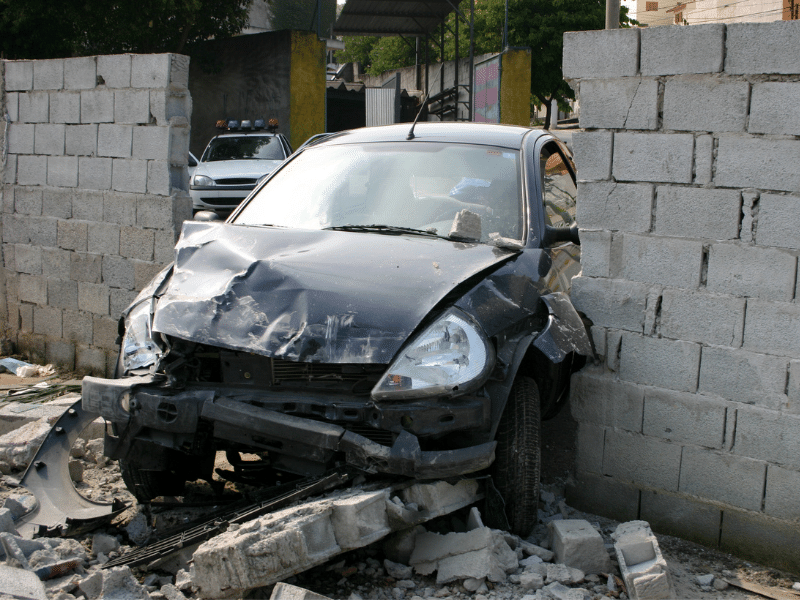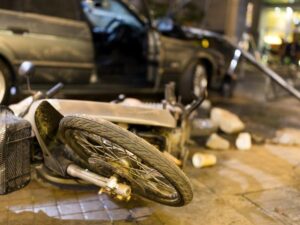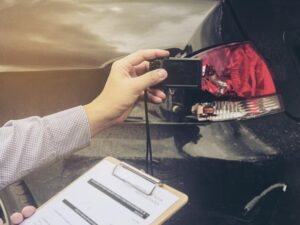
If your property was damaged in a car accident, you may be entitled to fair compensation for its repair or replacement. But what types of property damage are compensable, and who pays? The specific circumstances of the traffic accident, along with Michigan personal injury and auto insurance laws, determine the answers to these questions. An experienced Detroit car accident lawyer can help you understand your options and navigate the claims process.
The Michigan personal injury attorneys at Christensen Law have decades of experience handling all types of motor vehicle accident claims. In that time, we have earned a reputation for excellence among our clients and the communities we serve. If you or a loved one suffered injuries in a car accident, call or contact us today for a free consultation.
What Is Property Damage in a Car Accident?
 Property damage in a car accident can include more than just damage to your vehicle. A property damage claim can include any tangible property that was damaged in the accident, such as:
Property damage in a car accident can include more than just damage to your vehicle. A property damage claim can include any tangible property that was damaged in the accident, such as:
- Your home or property, including the building, fences, mailbox, lawn, and anything else on the property
- Electronics, such as a cell phone, laptop, or smartwatch
- Personal items, such as clothing, jewelry, or sunglasses
- Child safety seats or booster seats, since safety experts recommend that you replace these after a moderate or severe car accident
- Veterinary bills for pets who were in the car at the time of the accident and were injured
Insurance Options for a Property Damage Claim
Michigan follows a no-fault insurance system, which means injured victims first turn to their own insurance policy for compensation for medical bills, lost wages, replacement services, and other losses ― but not property damage.
No-fault insurance does not pay for the repair or replacement of your vehicle in the event of an accident. Instead, optional add-on collision coverage does.
Collision coverage comes in three forms:
- Limited: You can file a claim if you were less than 50 percent at fault for the crash and will be responsible for paying the deductible.
- Standard: You can file a claim regardless of whether you were at fault, but will still need to pay the deductible.
- Broad: You can file regardless of fault and only have to pay the deductible if you were more than 50 percent to blame for the wreck.
One exception to the rule is if a driver damages your tangible property like buildings, fences, and properly parked automobiles. In this case, the driver’s state-mandated property protection insurance (PPI) would cover the cost of the damage.
In Michigan, payouts on PPI claims are limited to $1 million. For damage of more than $1 million, you may need to use your own insurance to recover additional compensation. You also have the option of suing for damage to property when the damages exceed the $1 million limit or if the insurance company refuses to pay.
Another exception is known as a mini-tort claim. In a mini-tort, you can recover up to $3,000 for vehicle damage from an at-fault driver, either personally or through their insurer.
How Do I File a Property Damage Claim?

- Contact the police immediately. An officer will make an official report at the scene, which creates proof of the accident and may include the officer’s assessment of who was at fault. This information is vital for an insurance claim.
- Report the accident to your insurance company, regardless of who you believe is at fault or how serious the collision appears. This step is critical to protecting your right to compensation.
- File the claim. This step will differ depending on whether you’re filing a collision claim against your own insurance policy, a mini-tort action, or a property protection claim against the at-fault driver. Be sure to report all property damage, not just the damage to your car.
- Work with the insurance adjuster to get your car repaired. The adjuster will investigate the details of the claim, obtain repair cost estimates, and coordinate between you and the repair shop to get the car fixed.
Finalize your insurance payout. If your vehicle was “totaled,” the insurance company will send you a check for the value of your car before the accident. Your final insurance payout should also include the value of any other personal property that was damaged in the accident.
If you run into any difficulty at any step in the process, you should immediately contact an experienced Michigan car accident lawyer.
Tips for Filing a Property Damage Claim
Here are some useful things to know about filing a property damage claim:
- You have the right to request a rental car during the time when your vehicle is being repaired. The insurance company may not offer one, so make sure you ask. Alternatively, you can ask for monetary compensation for the “loss of use” of your car.
- You should insist on Original Equipment Manufacturer (OEM) parts. Your car should be repaired so that it is returned to you in the same condition it was in before the accident. Insurance companies often save money by authorizing repair shops to use only “aftermarket” parts, which tend to be cheaper and of lesser quality than OEM parts. You should insist on the authorization of only OEM parts for your claim before any repairs begin.
- Your claim will be affected if you were at fault. If you have optional collision coverage, you may be able to file a claim against your own policy if you were at fault in the accident. However, depending on the terms of the policy, you may also have to pay a deductible before receiving compensation. You can also expect your insurance premiums to increase after the claim.
Contact a Detroit Car Accident Attorney Today
Property damage claims can be complicated, but you don’t need to navigate the process alone. The knowledgeable attorneys at Christensen Law in Michigan can calculate and document the total value of your losses so that you can pursue the compensation you deserve. Call or contact us today for a free consultation.




